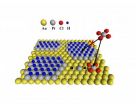(Press-News.org) DETROIT – Urologists at Henry Ford Hospital have developed a new technique that could make minimally invasive robotic partial nephrectomy procedures the norm, rather than the exception for kidney cancer patients. The technique spares the kidney, eliminates long hospital stays and provides better outcomes by giving the surgeon more time to perform the procedure.
Dubbed ICE for Intracorporeal Cooling and Extraction, the technique may allow more kidney cancer patients to avoid conventional open surgery – now used in the vast majority of cases – and its possible complications, including infection, blood loss, and extended hospital stays.
The Henry Ford study was published this week in European Urology, the official journal of the European Association of Urology.
"The study demonstrated that there's a two-pronged benefit," says Craig G. Rogers, M.D., director of Renal Surgery at Henry Ford Hospital's Vattikuti Urology Institute.
"Our goal was to protect the kidney from damage during a minimally invasive partial nephrectomy, and from a cancer standpoint, we have the added security that we've removed more of the tumor."
In the latest research, Henry Ford surgeons used robotic techniques to operate on seven kidney cancer patients between April and September 2012. In each case, they performed a partial nephrectomy, in which just the cancerous portion of the kidney is removed.
"What we've done is utilized a special type of device called a GelPoint trocar, that makes it easier to pass large things in and out of the abdomen through small incisions during minimally invasive surgery," says Dr. Rogers.
"Through the gel point, we take a syringe that's been modified so we can pack and deliver ice through the body to the kidney. So when we clamp the blood supply to the kidney, it's packed in ice just as it would be in an open surgery.
"Once the tumor is removed, instead of setting it aside in the body so you can sew up the kidney, we can remove the tumor as soon as it's excised through the gel point, look at it and decide if we're happy with what's been removed. If there's any doubt, I can go right back in and cut more out."
Dr. Rogers wrote in the study that others have tried various techniques to cool the kidney in minimally invasive surgery, but they "require specific equipment or expertise and are too complex or impractical for routine use."
"Unfortunately, the majority of people today diagnosed with kidney cancer get their entire kidney removed," Dr. Rogers says. "Not only that, they're getting it removed through an open approach, though a large incision that often requires removal a rib, when there are minimally invasive approaches, such as robotic surgery, available."
One of the reasons more patients aren't given the option of a partial nephrectomy is because for the surgeon, it's technically challenging to do and much more difficult to perform than taking the entire kidney out.
Dr. Rogers explains: "In order to safely perform a partial nephrectomy, surgeons often have to clamp off the blood supply to the kidney to allow them to see the tumor and cut it out in a bloodless field. But once the blood supply is cut off to the kidney, there's only about 30 minutes before the kidney can experience irreversible damage. That means the surgeon has to be very technically skilled to remove the tumor, and sew the kidney back together in a very short time.
"Time is a barrier for many surgeons to offer the partial nephrectomy procedure to their patients. Or, for those who do, they'll offer the open approach to a partial nephrectomy, which means a bigger operation for the patient. There are two things surgeons who perform open nephrectomies have been able to claim, up until now, that they could do which minimally invasive surgeons could not.
First, when the surgeon is holding the kidney in the open approach and the clamp goes on the kidney to stop the blood flow, he can pack the kidney on ice to cool it, called renal hypothermia. It allows the surgery to extend the window of time he has to work without kidney damage," says Dr. Rogers.
The other claim is that when the tumor is cut out, the surgeon can hold it and analyze it, to make sure that he is happy with what's been removed before sewing the kidney back up.
"Before, with a minimally invasive partial nephrectomy, it was very hard to get ice in through the small incision and to get the ice to stay where you want it. And then once the tumor's cut out, you really can't take it out of the body right away and look at it," says Dr. Rogers.
"The reason why I'm so excited about what we've discovered and innovated at Henry Ford is that it cuts to the core of the real problem. We can now offer more patients partial nephrectomy through a minimally invasive approach. So any technology that allows patients to get a better surgery and a better outcome in a less invasive way, is going to be something that will benefit everyone."
###
Note: You may request a pdf of the study or go online at http://www.sciencedirect.com/science/article/pii/S0302283812013607.
New technique for minimally invasive robotic kidney cancer surgery
2012-12-13
ELSE PRESS RELEASES FROM THIS DATE:
Regenstrief study finds that generic drugs often have incorrect safety labeling
2012-12-13
INDIANAPOLIS -- Despite U.S. Food and Drug Administration regulations requiring generic medications to carry identical warnings to those on corresponding brand-name products, a study by Regenstrief Institute researchers has found that more than two-thirds of generic drugs have safety-warning labels that differ from the equivalent brand-name drug.
The investigators reviewed 9,105 product labels for over 1,500 drugs available on DailyMed, an online repository of labeling information maintained by the FDA and the National Library of Medicine. Of the 1,040 drugs with more ...
Novel NIST process is a low-cost route to ultrathin platinum films
2012-12-13
A research group at the National Institute of Standards and Technology (NIST) has developed a relatively simple, fast and effective method of depositing uniform, ultrathin layers of platinum atoms on a surface.* The new process exploits an unexpected feature of electrodeposition of platinum—if you drive the reaction much more strongly than usual, a new reaction steps in to shuts down the metal deposition process, allowing an unprecedented level of control of the film thickness.
Platinum is a widely used industrial catalyst—in automobile catalytic converters and hydrogen ...
Solar power prices to continue falling through 2025, experts say
2012-12-13
Prices for solar modules—the part of solar panels that produce electricity—will continue to fall, in line with the long-term trend since 1980, according to a survey of experts by Near Zero, , a nonprofit energy research organization. However, for prices to keep falling for the long term will require continued committment to research, such as on materials used for making solar modules.
To get a sense of what future prices for solar power are likely to be, as well as other challenges and bottlenecks that the industry faces, Near Zero conducted a formal, quantitative survey ...
Tool could help uncover bias against female faculty in STEM fields
2012-12-13
A new Northwestern University study of professors in STEM fields at top research universities across the country shows that bias against women is ingrained in the workforce, despite a societal desire to believe workplace equality exists.
The quantitative study of the complete publication records of more than 4,200 professors in seven STEM fields (science, technology, engineering and mathematics) confirms that, for some disciplines, female faculty do publish fewer papers than male faculty but not for lack of talent or effort.
The researchers found the "productivity ...
Patients with family history of colorectal cancer may be at risk for aggressive form of the disease
2012-12-13
BOSTON--When people with a family history of colorectal cancer develop the disease, their tumors often carry a molecular sign that the cancer could be life-threatening and may require aggressive treatment, Dana-Farber Cancer Institute scientists report in a new study.
The finding, reported in the Journal of the National Cancer Institute, draws on data from studies that have tracked the health of tens of thousands of people over several decades. It suggests that colorectal cancer patients could one day have their tumor tissue tested for the molecular sign, and, if necessary, ...
Targeted micro-bubbles detect artery inflammation, MU study finds
2012-12-13
COLUMBIA, Mo. — Heart disease is a leading cause of death throughout the world. Doctors say that it is important to detect heart disease early before it becomes too serious. Now, researchers at the University of Missouri have found a way that they believe could help detect heart disease before it progresses too far as well as identify patients who are at risk for strokes.
In a study published in Medicine and Science in Sports and Exercise, Isabelle Masseau, an assistant teaching professor in the MU College of Veterinary Medicine, found that she could use targeted micro-bubbles ...
Delaying childbirth may reduce risk of an aggressive form of breast cancer
2012-12-13
SEATTLE – Younger women who wait at least 15 years after their first menstrual period to give birth to their first child may reduce their risk of an aggressive form of breast cancer by up to 60 percent, according to a Fred Hutchinson Cancer Research Center study. The findings, by Christopher I. Li, M.D., Ph.D., a member of the Public Health Sciences Division at Fred Hutch, are published online in Breast Cancer Research and Treatment.
"We found that the interval between menarche and age at first live birth is inversely associated with the risk of triple-negative breast ...
Hubble census finds galaxies at redshifts 9 to 12
2012-12-13
Astronomers using the NASA/ESA Hubble Space Telescope have uncovered seven primitive galaxies from a distant population that formed more than 13 billion years ago. In the process, their observations have put forward a candidate for the record for the most distant galaxy found to date (at redshift 11.9), and have shed new light on the earliest years of cosmic history. The galaxies are seen as they were when the Universe was less than 4 percent of its present age.
A team of scientists using the Hubble Space Telescope has made new observations of the Hubble Ultra Deep Field ...
Notre Dame research may have important implications for combating diabetes
2012-12-13
Research by University of Notre Dame biochemist Anthony S. Serianni is providing new insights that could have important implications for understanding and treating diabetes.
Serianni points out that biological compounds known as dicarbonyl sugars are produced inside the human body from the natural breakdown of the simple sugar, glucose. The formation of these sugars is enhanced in diabetic patients because glucose concentrations in the blood and plasma of diabetics are significantly elevated.
"We investigated, under laboratory conditions that approximate those in the ...
Too big or just right? Optimal circle of friends depends on socioeconomic conditions
2012-12-13
Some people like to have a few close friends, while others prefer a wider social circle that is perhaps less deep. These preferences reflect people's personalities and individual circumstances — but is one approach to social networks "better" than the other? New research suggests that the optimal social networking strategy depends on socioeconomic conditions.
Researchers Shigehiro Oishi of the University of Virginia and Selin Kesebir of the London Business School explore the benefits of social networking strategies in two studies published in Psychological Science, a ...




